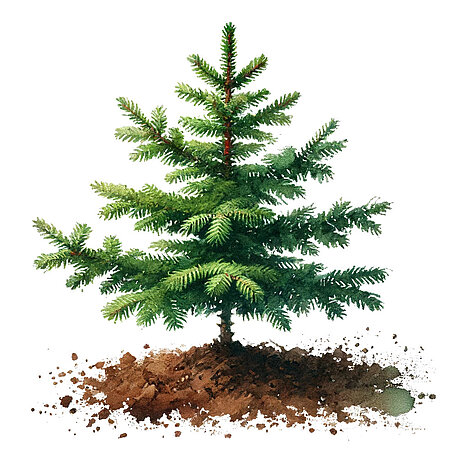Sitka spruce

Nature holds many secrets, some of which have the potential to enrich or endanger the lives of our four-legged companions. The Sitka spruce, a majestic tree native to the temperate rainforests of the Pacific Northwest, is the focus of much debate among dog owners and experts. But what is the truth of the stories? Is the Sitka spruce a hidden gem or a hidden risk for our dogs? This in-depth article dives deep into the world of Sitka spruce to shed some light on the darkness.
A tree full of secrets
The Sitka spruce (Picea sitchensis) is remarkable not only for its impressive height and robust growth, but also for its many uses in the timber industry and landscaping. However, while its aesthetic and economic values are well documented, the effects of its components on dogs remain largely in the shadows. This article strives to address this information gap by thoroughly examining the constituents of Sitka spruce and their potential effects on dogs.
Looking under the bark: The constituents of Sitka spruce
Sitka spruce is made up of different parts - from the bark and needles to the resins and seeds. Each of these parts contains different substances that can potentially affect a dog's health.
Bark and needles: A potential danger?
The bark and needles of Sitka spruce contain essential oils and terpenes, which can be aromatic and harmless in small amounts. However, larger amounts of these substances can cause gastrointestinal discomfort in dogs. Symptoms of such exposure can include vomiting, diarrhea and lethargy. It is therefore advisable to ensure that dogs do not play with or chew the bark or needles of Sitka spruce.
Resins and seeds: A double sword
Resins produced by Sitka spruce are rich in various organic compounds. Although they are valued in traditional medicine for their antibacterial properties, they can cause allergic reactions in dogs if they come into contact with the skin or are ingested internally.
While Sitka spruce seeds are not toxic, ingesting them in large quantities can cause digestive upset due to their fat content. Moderate curiosity can therefore have unpleasant consequences for your four-legged friend.
Better safe than sorry
Sitka spruce is not toxic to dogs per se, but certain components can cause health problems in sensitive animals or in large quantities. Wisdom lies in caution. It's a good idea to monitor your dog's interaction with this tree and make sure they don't nibble on the bark, eat the needles or come into contact with the resin.
Being in nature and exploring its diversity is enriching for both dogs and their owners. However, as with everything in life, a conscious approach to the environment is crucial to enjoying the pleasures safely. The Sitka spruce, majestic as it may be, should be treated with respect and caution when it comes to our furry friends.
If you notice any signs of hypersensitivity or poisoning in your dog, you should see your vet immediately. We are not a substitute for a vet, but we try to be as accurate as possible. Every dog reacts differently and we recommend you get a second opinion or consult your vet if in doubt.
Stay healthy and take good care of your four-legged friend!😊